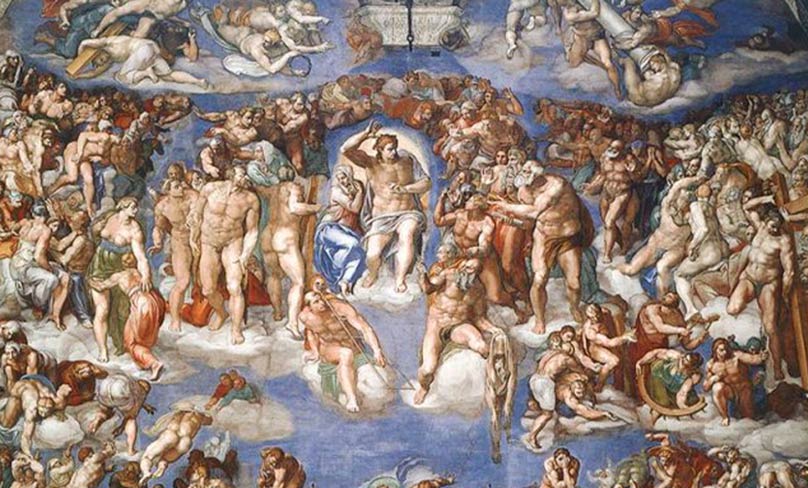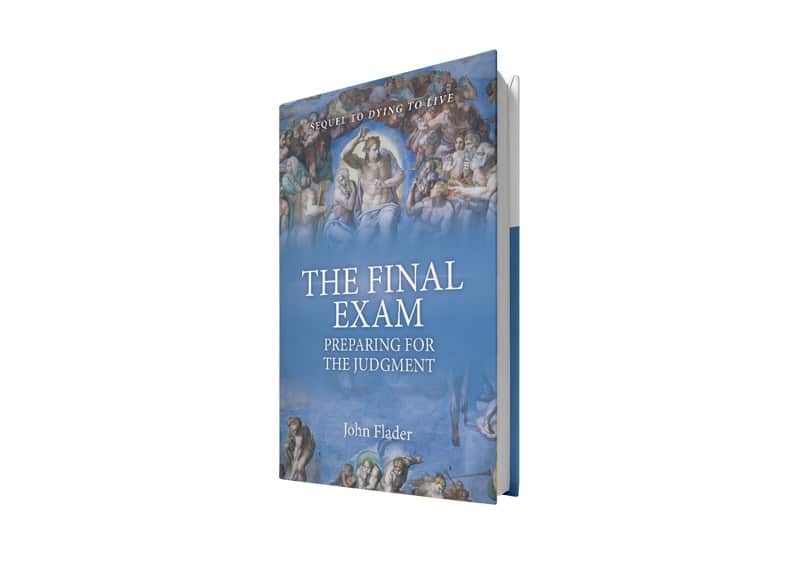
Fr John Flader describes his new book, The Final Exam – Preparing for the Judgment, as a sequel to his previous book, Dying to Live. In fact, it is more than a sequel, because the two books are complementary in content and character. Everything, but everything, for healthy daily living (and spiritually healthy dying) is covered within and between the two.
In a very readable style, the author deals with topics which too many of us would prefer to avoid. As its title suggests, the purpose of this book is to help the reader prepare well for the ‘final exam’, the judgment. Even if one is nearing the end of life right now, as I am, the book shows how the reader can still turn a possible failure into a brilliant success.
The author assists in this by covering all aspects of morality in simple language, which is not always easy to do. He challenges our world of moral relativism, which we have inherited from the Enlightenment – the “my values are not your values, to each his own” way of thinking – showing how morality is objective, based on human nature, on the natural law.
It is on this objective standard, common to all human beings, no matter what their religious belief, that God will judge us. As the author points out, this is fair, since we will all be judged by the same standard. And if we fail this exam, we cannot appeal to a higher authority, because there isn’t one. Nor can we ask to take the exam again. This is the end, the final exam. That is why this book is so important. It shows the reader how to live in such a way as to be well prepared for the judgment at the moment of death.
The book uses numerous examples and stories to explain such complex matters as the natural law and objective morality, the nature and importance of human freedom, the vital role of conscience, the influence of emotions on our actions, the importance of virtues, the different types of sins, etc.
An interesting topic is the role of temptations. Temptations are, as the author shows from the etymology of the word, simply tests. In temptations we are tested on our degree of virtue, on our resolve to do the right thing. Through them we see how strong, or weak, we are. And by overcoming them we grow in strength. God allows us to be tempted but he always gives us sufficient grace to overcome the temptations. Temptations are thus little tests along the road of life to prepare us for the great test at the end. As the book explains, they can be sources of sin but also sources of sanctity.

This leads naturally into one of the great mysteries of life, suffering. We all suffer, to one degree or another, and, as the author shows, how we deal with it can have an important bearing on how we fare in the judgment. Our hedonistic society, where the pursuit of pleasure is the goal of life for many, looks on any effort to understand and accept suffering as utter folly. But the author shows how suffering, well borne, can not only have meaning but even be a blessing. Using examples, he lists seven ways this is so.
I learnt about this first-hand, as I was married for 43 years to a chronically ill wife and I saw her grow from fiery rebellion to joyful acceptance as she became increasingly aware of her role in God’s plans. Much of her growth as a person was from some wonderful friends who visited her regularly, and from the inspiring example of Pope St John Paul II. The peaceful serenity of her famous smile was rewarded by God when she died at the very moment our parish priest finished anointing her. If it were only for this chapter, this book would be well worth reading.
After dealing with questions relating to moral life in general, the book goes on to discuss specific moral issues, following the ten commandments. While the average person would be inclined to consider the ten commandments as uniquely Judaeo-Christian ethics, Fr Flader shows how they are based on the natural law, and hence are common to all peoples. They oblige everyone. In addition to explaining the morality of obvious issues like murder, adultery and stealing, the book does not hesitate to show how such matters as the worship of God, abortion, euthanasia, scandal and slander are also governed by the natural law and hence oblige everyone. The book uses many beautiful stories and testimonies to highlight this teaching.
The last chapter examines various aspects of the judgment itself, including that we must be truly sorry for our sins, that we will be judged in accordance with the particular gifts and graces God has given to each one, and that God will take into account what we knew or did not know about his law. He is a God of mercy as well as of justice.
Throughout the book Fr Flader shows that God is not an anonymous force; he is a person, he has a name. He is a God of love and mercy and he wants everyone to know, trust and love him. He makes himself accessible to us through his Son Jesus Christ, so that we can know him more intimately and address him personally.
God loves everyone, every single human being. Jesus died for all and he wants all to be saved. There is a place in heaven for everyone and God wants all to be with him there. He wants all to pass the final exam and he gives everyone sufficient grace to do so. Endorsed by Scott Hahn and others, this book will be a big help to travel the road of life to that final destination.
The Final Exam: Preparing for the Judgment, by Fr John Flader, Connor Court Publishing., paperback, 168 pages.
